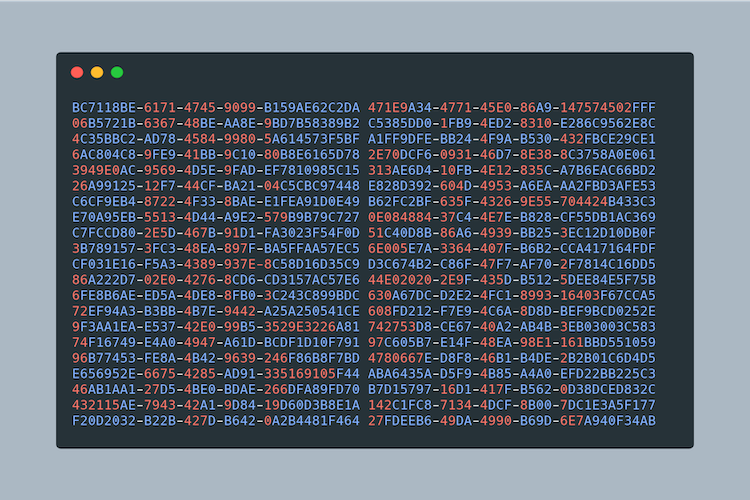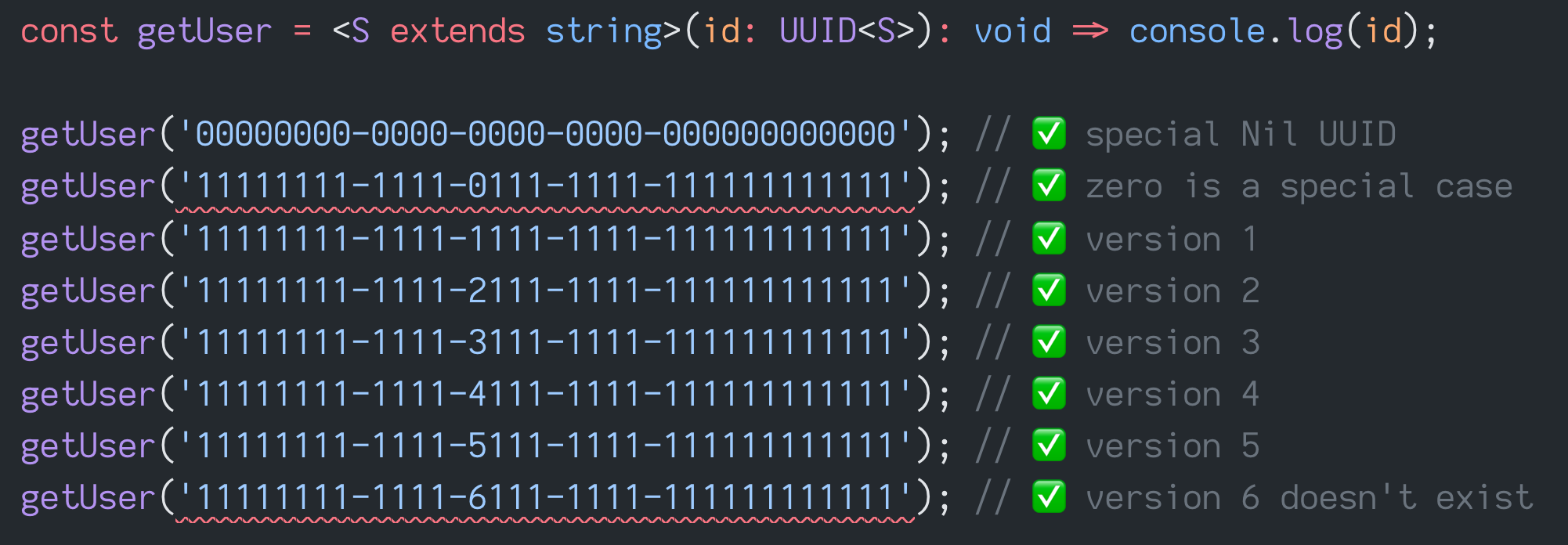Compile-time validation of UUIDs

Type-level UUID numbers
It happens so that we can use recent TypeScript’s type system improvements to get a compile-time validation of UUID number, including validation of correctness of its version. We start with defining a set of allowed symbols for both hex alphabet and (separately) for version:
type VersionChar =
| '1' | '2' | '3' | '4' | '5';
type Char =
| '0' | '1' | '2' | '3'
| '4' | '5' | '6' | '7'
| '8' | '9' | 'a' | 'b'
| 'c' | 'd' | 'e' | 'f';
UUID format is the following: xxxxxxxx-xxxx-Mxxx-Nxxx-xxxxxxxxxxxx, with M representing version (special case for 0, and actual versions are 1-5) and N representing variant. To encode this, let’s create a helper which will check if a string S consists of Chars and has length of Len symbols.
Unfortunately, TypeScript’s strings, even literal ones, don’t have length as a constant — it’s just a number. So we need to implement this check using a recursive type with an accumulator.
I’m also defining a helper Prev to calculate previous number for a given one. It uses accessing tuple by index to get a previous number regarding the index — e.g., for X = 5 it will get sixth element of a tuple, which is 4. As the longest group of symbols in UUID has length of 12, so maximal number present in a tuple is 11, and rest are nevers:
type Prev<X extends number> =
[never, 0, 1, 2, 3, 4, 5, 6, 7, 8, 9, 10, 11, ...never[]][X];
type HasLength<S extends string, Len extends number> = [Len] extends [0]
? (S extends '' ? true : never)
: (S extends `${infer C}${infer Rest}`
? (Lowercase<C> extends Char ? HasLength<Rest, Prev<Len>> : never)
: never);
Now we can define helpers to check whether a string is a group of 4, 8, 12, a special case — version and 3 more bytes, and a special case of nil UUID:
type Char4<S extends string> = true extends HasLength<S, 4> ? S : never;
type Char8<S extends string> = true extends HasLength<S, 8> ? S : never;
type Char12<S extends string> = true extends HasLength<S, 12> ? S : never;
type VersionGroup<S extends string> = S extends `${infer Version}${infer Rest}`
? (Version extends VersionChar
? (true extends HasLength<Rest, 3> ? S : never)
: never)
: never;
type NilUUID = '00000000-0000-0000-0000-000000000000';
Finally, we can write a (rather lengthy and mouthful) definition of UUID number, using previously defined helpers:
type UUID<S extends string> = S extends NilUUID
? S
: (S extends `${infer S8}-${infer S4_1}-${infer S4_2}-${infer S4_3}-${infer S12}`
? (S8 extends Char8<S8>
? (S4_1 extends Char4<S4_1>
? (S4_2 extends VersionGroup<S4_2>
? (S4_3 extends Char4<S4_3>
? (S12 extends Char12<S12>
? S
: never)
: never)
: never)
: never)
: never)
: never);
Time for some examples! Let’s imagine we have a function which gets a user by its UUID. I don’t really care about the implementation, so I’ll just log that id. But you can clearly see that incorrect cases are rejected by the compiler, and correct ones are allowed:
